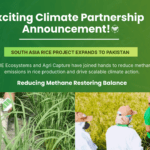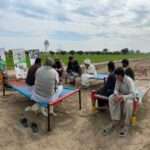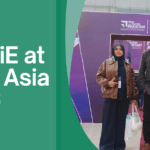News
Pioneering Youth Engagement in Land Governance: SAWiE’s Voice at COP16 Riyadh
Khalid Mahmood, CEO & Co-founder of SAWiE, had the honor of delivering a keynote presentation titled “Protecting and Preserving our Land through Youth Engagement: Enhancing Youth Participation in Land Governance to Ensure Intergenerational Equity in Climate Solutions” at COP16 in Riyadh. This remarkable event brought together leaders, innovators, and changemakers from across the globe to address the critical challenges of land degradation and sustainable governance.

Top News
Soil and Land Degradation: A Global Crisis
Soil and land degradation are among the most pressing environmental issues threatening global food security, biodiversity, and climate stability. According to the United Nations, about 25% of the world’s land is highly degraded, affecting the livelihoods of over 1.5 billion people. The loss of fertile soil due to erosion, unsustainable agricultural practices, deforestation, and urban expansion has far-reaching impacts, including reduced agricultural productivity, water scarcity, and the release of carbon stored in the soil, exacerbating climate change.
The consequences of land degradation are particularly severe for the most vulnerable communities, especially in regions already facing socio-economic challenges. Without urgent action, the world could lose an estimated 1.5 million hectares of arable land annually—land that is critical for food production, ecosystem balance, and human survival.
Causes of Land Degradation and Solutions
The key drivers of land degradation include overgrazing, deforestation, intensive farming practices, and pollution. Addressing these challenges requires a multi-pronged approach:
- Sustainable Land Management Practices: Techniques such as crop rotation, agroforestry, and conservation tillage help protect soil structure and fertility while minimizing erosion.
- Reforestation and Afforestation: Planting trees and restoring degraded forests play a vital role in replenishing soil organic matter, improving water retention, and enhancing biodiversity.
- Technology-Driven Solutions: Digital agriculture, precision farming, and innovations like biochar application provide scalable methods to restore soil health and boost agricultural productivity.
- Policy and Governance: Implementing policies that incentivize sustainable practices and penalize exploitative activities is crucial for long-term success.
Youth: The Catalysts for Change
Youth engagement is essential in combating land degradation and fostering sustainable development. Young people possess the energy, creativity, and commitment to drive transformational change. Through education, capacity-building, and active involvement in decision-making processes, they can become powerful agents of change for land governance and restoration.
In his keynote address, Khalid Mahmood emphasized the importance of equipping youth with the knowledge and tools to actively contribute to sustainable solutions. He highlighted how engaging young minds in understanding the interconnections between food systems, soil health, water management, and biodiversity can pave the way for resilient communities and ecosystems.
At SAWiE, we have seen the impact of youth-driven initiatives firsthand. From leveraging digital tools to empower farmers with real-time advisory services to promoting regenerative agricultural practices, young professionals and volunteers have played a pivotal role in our journey. Their innovative ideas and unwavering passion underscore the need to integrate youth into sustainability strategies at all levels.
SAWiE’s Commitment to Sustainability
SAWiE remains deeply committed to addressing land and soil degradation through innovative agritech solutions. We believe that combining technology, traditional knowledge, and community participation is the key to achieving sustainable development goals. Our efforts align with global movements such as the United Nations’ Land Degradation Neutrality initiative and aim to contribute meaningfully to climate action and resilience.
Acknowledging the COP16 Riyadh Organizers
We extend our heartfelt gratitude to the organizers of COP16 Riyadh for inviting SAWiE to this prestigious forum. This event, being the first UNCCD COP hosted by the Kingdom of Saudi Arabia, marks a significant milestone in uniting global efforts to tackle desertification, land degradation, and drought. The focus on youth engagement and the Saudi Green Initiative demonstrates the region’s commitment to driving positive change for a more sustainable future.
Participating in COP16 provided an incredible platform to share SAWiE’s vision, learn from global leaders, and collaborate with diverse stakeholders. We look forward to building on these connections and exploring joint efforts to protect our natural capital.
Looking Ahead
The challenges of land degradation and climate change require collective action, innovative solutions, and unwavering determination. By prioritizing youth engagement, fostering partnerships, and integrating sustainable practices into every aspect of land management, we can create a future where healthy soils and thriving ecosystems are the foundation of human progress.
As Khalid Mahmood concluded in his keynote, “The future of our planet depends on our ability to empower the next generation to become stewards of the land. Together, we can protect and preserve our natural resources for generations to come.”
Let us continue to work together to address these critical challenges and create a sustainable world for all.



